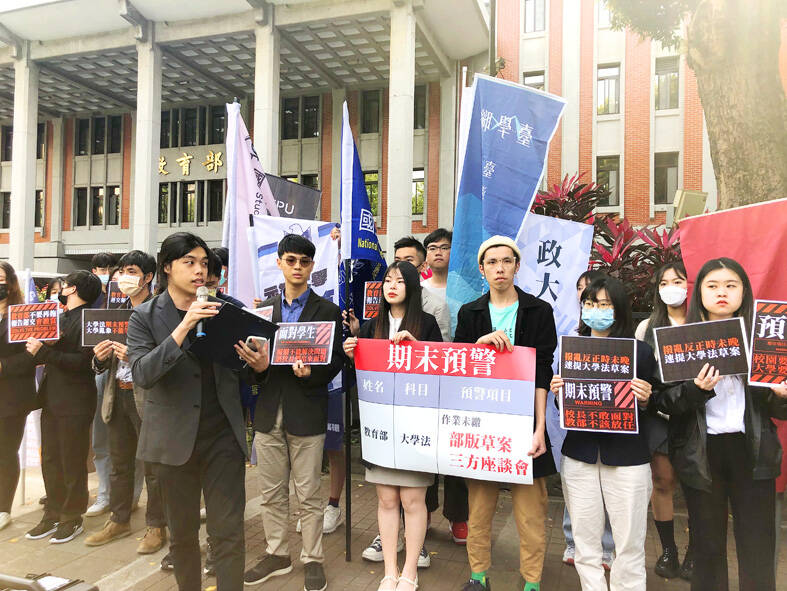University student representative groups on Monday last week protested the postponement of a draft amendment to the University Act (大學法), which would increase student representation in university councils to 20 percent from 10 percent.
Some of those protesting in front of the Ministry of Education speculated that university presidents pressured the ministry to put the amendment on hold.
Members of the National Students’ Union of Taiwan were among those at the protest.

Photo: Rachel Lin, Taipei Times
University presidents are being “giant babies” and the ministry should hasten the amendment’s passage, union secretary-general Huang Ting-wei (黃亭偉) said.
Union president Liu Yao-Wei (劉曜維), who studies at Yuan Ze University, said that capping student representation at 10 percent turns student voices into “white noise” at council meetings.
When meetings are held that affect students’ studies and well-being, school administration limits the representatives allowed to attend, despite others wanting a say on matters, Liu said.
National Taipei University of Technology student council deputy speaker Chao Yuan heng (趙元亨) said some university presidents oppose increasing student representation because student turnover is high.
However, university presidents have a term of four years, and council representatives have a term of one year, Chao said.
National Dong Hwa University student council president Chen Yen-ling (陳彥伶) said students comprise 90 percent of the campus populations, but with only 10 percent representation in university councils, proposals from students often hit obstacles.
Only by increasing student representation on the councils can “teacher-student cogovernance” be realized, United Student Union of North Taiwan deputy chairperson Feng Hui-lun (馮輝倫) said.
Union of Private School Educators president Yu Jung-hui (尤榮輝) said that the legislature should proceed with a review of the amendment regardless of whether the ministry forwards it.
Department of Higher Education deputy head Liang Hsueh-cheng (梁學政) met with the groups and received a student petition.
The ministry has held nine discussions on the issue from September to November last year, and is seeking common ground between all stakeholders before moving forward with the amendment, Liang said.

Alain Robert, known as the "French Spider-Man," praised Alex Honnold as exceptionally well-prepared after the US climber completed a free solo ascent of Taipei 101 yesterday. Robert said Honnold's ascent of the 508m-tall skyscraper in just more than one-and-a-half hours without using safety ropes or equipment was a remarkable achievement. "This is my life," he said in an interview conducted in French, adding that he liked the feeling of being "on the edge of danger." The 63-year-old Frenchman climbed Taipei 101 using ropes in December 2004, taking about four hours to reach the top. On a one-to-10 scale of difficulty, Robert said Taipei 101

Taiwanese and US defense groups are collaborating to introduce deployable, semi-autonomous manufacturing systems for drones and components in a boost to the nation’s supply chain resilience. Taiwan’s G-Tech Optroelectronics Corp subsidiary GTOC and the US’ Aerkomm Inc on Friday announced an agreement with fellow US-based Firestorm Lab to adopt the latter’s xCell, a technology featuring 3D printers fitted in 6.1m container units. The systems enable aerial platforms and parts to be produced in high volumes from dispersed nodes capable of rapid redeployment, to minimize the risk of enemy strikes and to meet field requirements, they said. Firestorm chief technology officer Ian Muceus said

MORE FALL: An investigation into one of Xi’s key cronies, part of a broader ‘anti-corruption’ drive, indicates that he might have a deep distrust in the military, an expert said China’s latest military purge underscores systemic risks in its shift from collective leadership to sole rule under Chinese President Xi Jinping (習近平), and could disrupt its chain of command and military capabilities, a national security official said yesterday. If decisionmaking within the Chinese Communist Party has become “irrational” under one-man rule, the Taiwan Strait and the regional situation must be approached with extreme caution, given unforeseen risks, they added. The anonymous official made the remarks as China’s Central Military Commission Vice Chairman Zhang Youxia (張又俠) and Joint Staff Department Chief of Staff Liu Zhenli (劉振立) were reportedly being investigated for suspected “serious

American climber Alex Honnold is to attempt a free climb of Taipei 101 today at 9am, with traffic closures around the skyscraper. To accommodate the climb attempt and filming, the Taipei Department of Transportation said traffic controls would be enforced around the Taipei 101 area. If weather conditions delay the climb, the restrictions would be pushed back to tomorrow. Traffic controls would be in place today from 7am to 11am around the Taipei 101 area, the department said. Songzhi Road would be fully closed in both directions between Songlian Road and Xinyi Road Sec 5, it said, adding that bidirectional traffic controls would